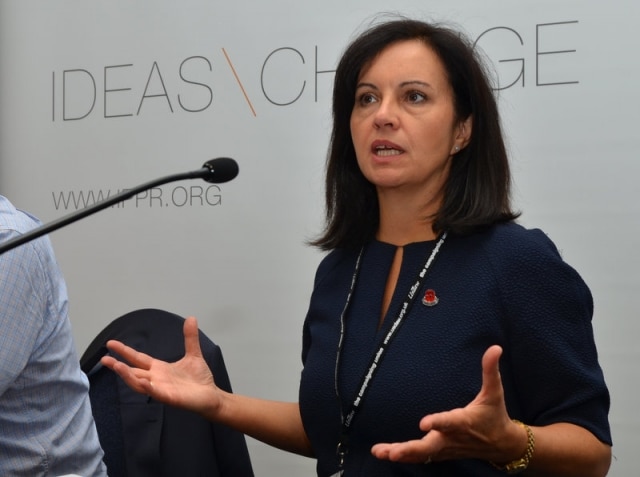Caroline Flint (pictured), of the Labour party, is centre stage with the opportunity to influence the international debate on climate change.
Rarely in politics is there such a confluence of events: Caroline Flint, the shadow secretary of state for energy and climate change, takes to the magenta-lit stage at the Labour party conference in Manchester during a rising tide of global warming campaigning.
Ban Ki-moon, United Nations (UN) general secretary, has compelled the world’s leaders to come together in New York to begin a storm of negotiations in the lead up to international talks at the 21st Conference of the Parties on Climate Change in Paris in 2015.
David Cameron, the British Prime Minister, will be in attendance alongside the American President, Barack Obama. Cameron will be under considerable pressure to rediscover his commitment to the climate cause.
However, Cameron must choose his words extremely carefully.
At home, he faces a growing rebellion in his own party stoked and inflamed by the former chancellor, Lord Lawson, and his climate denial charity, the Global Warming Policy.
Lawson has been busy rounding up malcontents, perhaps furious at the Scottish referendum scare and certainly angry about Europe.
At the same time, hundreds of American campaigners are being arrested as the younger generation of politically committed and concerned voters flood Wall Street.
This follows the mass demonstration of 400,000 people in New York, and the tens of thousands who protested in London and outside the Labour Conference in Manchester. They were joined by thousands in towns and cities around the world.
Manuel Cortes, left-wing firebrand general secretary of the Transport Salaried Staffs Association, received the most impassioned standing ovation of the event shortly before Flint took to the Labour front stage.
He claimed: “Social justice will remain a utopian dream unless there is public ownership.”
This is her moment to influence the debate of world leaders, to humiliate her political opponents with only eight months until the next general election, and to win the support of a new generation of young, conscientious Labour supporters.
And?
Flint came to the podium in a smart blue dress and confirmed Labour would freeze energy bills for 20 months and reform the energy market, evoking the image of children too cold to get out of bed.
She promised to insulate “leaky homes” to reduce energy bills and pollution.
And then she launched a scathing attack on Nigel Farage and his UK Independence Party, who are meeting next weekend. “Nigel and the climate change deniers. They do not believe in climate change… [they are] a spent force hiding from the future.”
She then evoked the British Blitz mentality, noting that 2014 is the centenary of the Great War and the 70th anniversary of D-Day, “declaring war on cold homes” and arguing “climate change is too costly to ignore”.
But she risked controversy by saying Labour’s plan to reduce climate emissions would rely on carbon capture and storage, so far unproven at scale, and nuclear power, which remains deeply unpopular with many environmentalists.
She argued that climate change is a “challenge [that] is not a burden…. an opportunity to create”. She concluded by describing Labour policy as “a vision worth fighting for today” with “no-one left in the cold. Warmer homes and, yes, warmer hearts. A Britain we can all believe in.”
There was a ripple of applause as she sat down. This speech was a steep change from last year when the secretary of state for climate change mentioned climate change only once in her speech to conference.
Maria Eagle, shadow secretary of state for environment, food and rural affairs, spoke before Flint and attacked Cameron for his record on climate change. But her own response appeared limited to restating old promises and reinstating flood defence plans.
“David Cameron promised to lead ‘the greenest government ever’. Then he put Owen Paterson in charge of our environment. What a joke!” She accused the Tories of failing to meet carbon emission targets, “obstructing onshore wind farms” and undermining the green investment bank.
“On climate change we will introduce a new adaptation plan and reintroduce flood protection as a core part of our protection of the environment,” she concluded. “Labour with replace incompetence, ideology and unfairness with a better vision.”
Yet, the Labour party line emerging from the 2014 conference appears to rest on the idea that working people will only back climate change policies that result in an immediate financial benefit.
Last night, DeSmog UK approached Ed Balls after his talk with the Huffington Post. We asked if he had drunk the neol-iberal Kool Aid. He seemed to believe that people only act on their own short-term self-interest. He ducked and weaved, avoided the question, and left the building.
Subscribe to our newsletter
Stay up to date with DeSmog news and alerts







